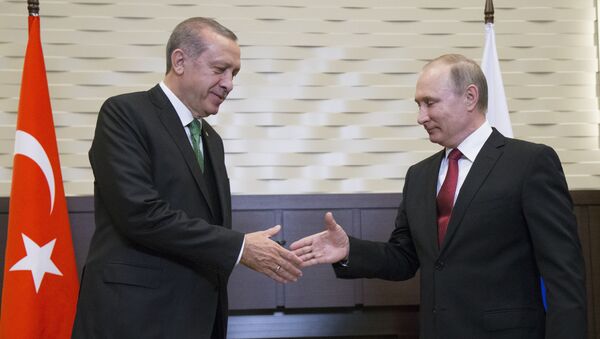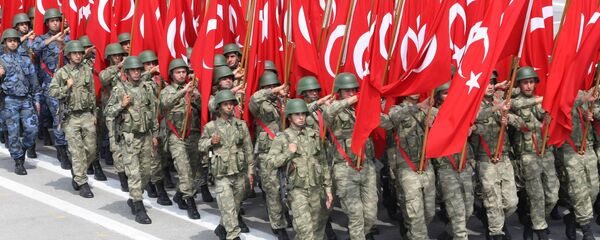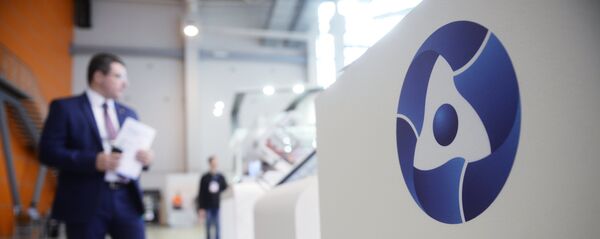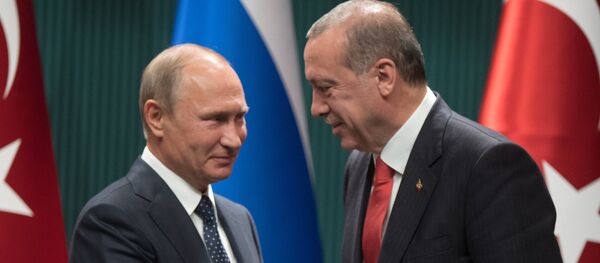The July 2016 coup attempt, the Astana peace negotiations on Syria and the agreement on the acquisition of the Russia-made S-400 anti-aircraft system by Ankara have played a substantial role in bringing Turkey and Russia together, Turkish journalist Cenk Baslamis told Sputnik.
"In the last 10-15 years, the concept of 'business visit' has gradually substituted the term 'official visit' [in Russo-Turkish relations] and has come to the fore. Such meetings put aside formalities, and focus primarily on results in negotiations," Baslamis highlighted commenting on the recent summit between Turkish President Recep Tayyip Erdogan and his Russian counterpart Vladimir Putin in the Black Sea resort city of Sochi.
The Turkish journalist underscored that there have been friendly and sincere relations as well as a special "chemistry" between Erdogan and Putin for over 13 years.
"Apart from the relatively brief period of the crisis that followed the incident with the [Russian Su-24] aircraft, it can be said that these relations have lasted from the very beginning to this day," Baslamis told Sputnik Turkey.
After the attempted coup in Turkey which occurred on July 15, 2016, relations between Turkey and Western countries have become tense, Baslamis recalled. However, simultaneously, the process of active cooperation between Ankara and Moscow has resumed. The Turkish journalist drew attention to the fact that Putin was among those who immediately offered support to Ankara after the coup attempt.
Baslamis noted that "it may be somewhat premature to say that the relationship has reached a higher level than it was before the crisis," but if one compares the situation at end of 2015 and the current status quo, no one would deny that the two countries have done a great job over the last two years.
Russo-Turkish Relations Have Reached New Heights
In contrast to Baslamis, Turkish lawmaker and parliamentary Planning and Budget Commission member Nejat Kocer believes that the frequent meetings between the presidents shows that the Russo-Turkish relationship has reached new heights.
"Paradoxically, the crisis [which Russia and Turkey have managed to overcome] contributed to the improvement in the relationship of the two leaders," Kocer said. "We have passed through a difficult period, but at the moment we see a rapidly developing positive process in bilateral relations. The wounds have healed."
The parliamentarian also mentioned the joint Russo-Turkish Akkuyu Nuclear Power Plant (NPP) project and highlighted the fact that Erdogan invited Putin to attend the ceremony to pour the first concrete at the atomic station.
"The existence of a nuclear power plant in Turkey is an indispensable condition for the development of the country's energy sector," Kocer stressed. "Turkey needs to make a breakthrough in the diversification of its energy policy. We look forward to the foundation of the Akkuyu NPP."
The Turkish politician believes that "the development of mutually beneficial relations without creating the prerequisites for the emergence of tension, the strengthening of trade ties based on the protection and respect for mutual interests are of high importance" for both Turkey and Russia.
Additionally, Kocer emphasized the Russo-Turkish partnership in the Black Sea and stressed the necessity of close collaboration between Moscow and Ankara in the region.
"All these indicate that Turkish-Russian relations have all the preconditions to enter a qualitatively new level of development," the parliamentarian suggested.
Among other issues, the presidents discussed the Turkish Stream gas pipeline, the construction of the Akkuyu NPP and the acquisition of Russia's advanced S-400 Triumf anti-aircraft system by Turkey.
On September 29, Russian presidential aide Vladimir Kozhin confirmed that Turkey had made an up-front payment for the S-400s, adding that the delivery is scheduled for 2019. Ankara signaled that it wants its S-400 agreement with Russia implemented as soon as possible.





